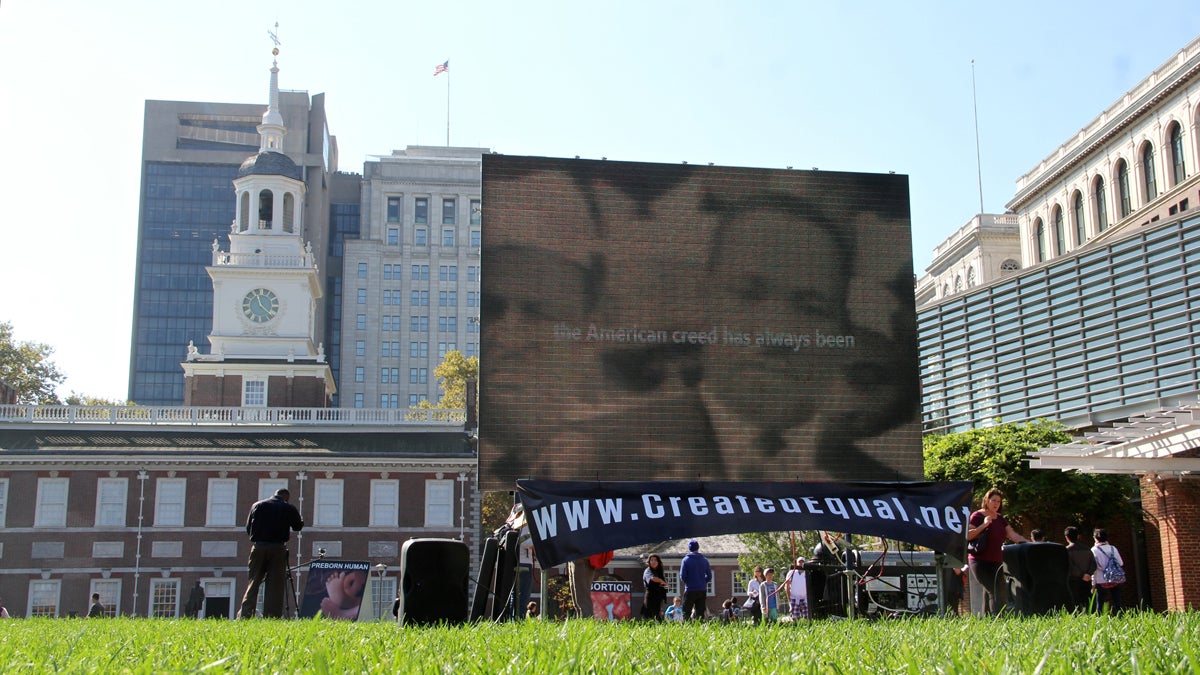Anti-abortion activists exploit civil rights messages while omitting King’s family planning legacy

Anti-abortion activists set up a graphic display on Independence Mall. (Emma Lee/WHYY)
An anti-abortion group calling themselves “Created Equal” is in Philadelphia today with the sole purpose of blitzing tourists and residents with what the Philadelphia Inquirer described as a “high-tech assault.” They have a 10-foot-tall screen on Independence Mall where they are broadcasting a video that opens with black-and-white footage of the late Dr. Martin Luther King, Jr.’s call for equal rights at the 1963 March on Washington, then cuts to full-color “gruesome close-ups of the bloody remnants of abortions.” Willing or not, tourists, residents, children and families will be forced to view these images.
Created Equal takes a specific jab at the African-American community by co-opting the legacy of civil rights leader Dr. Martin Luther King, Jr. This tactic shamelessly exploits the political struggle of black Americans to achieve their human rights and fully manifest that noble ideal of being “created equal.”
In doing that, they omit the important legacy of Dr. King’s support for family planning. When he received the Margaret Sanger award in 1966, Dr. King said,
“There is no human circumstance more tragic than the persisting existence of a harmful condition for which a remedy is readily available. Family planning, to relate population to world resources, is possible, practical and necessary. Unlike plagues of the dark ages or contemporary diseases we do not yet understand, the modern plague of overpopulation is soluble by means we have discovered and with resources we possess.”
For the last several years, the anti-abortion movement has stigmatized and shamed black women in particular through unsuccessful attempts to filter their abortion-restricting agenda through the legacy of the Civil Right movement. It is imperative for black communities, women and abortion providers, who are the targets of these tactics, to understand the deceptive nature of this cultural and political attack.
On their website, the Columbus, Ohio-based group explicitly advocates against “consensual” communication. On Facebook, the group revealed they intend to broadcast not only pictures, but also footage of “abortions in progress.” Assaulting passersby with (sometimes doctored) bloody imagery is nothing new for anti-abortion groups, while at the same time shouting racially motivated epithets to women of color exercising their human right to abortion care.
An incoherent message
Relevant history and public health data persuasively highlights the need for women to have access to safe abortion services; lacking a rational argument, anti-abortion advocates have long relied on communication styles designed to incite emotions, rather than appeal to logic.
Over the years, the anti-abortion advocacy has become more and more incoherent — for example, working to restrict access to both abortion and birth control, while threatening to cut welfare benefits for mothers whose pregnancies are not the result of rape or incest. As the political tactics and restrictions for women have grown increasingly invasive, the bloody images have grown bigger. At the core of the anti-abortion agenda is the condescending belief that women do not have the capacity to make important decisions about their bodies.
Still, it is not the lack of basic respect for their targets and profound misunderstanding of why women have abortions that we find most disturbing. It is the audacity of these activists to co-opt the imagery and words of Dr. Martin Luther King, Jr. to spread a message — and policies — that disproportionately hurt black communities.
Video reports show the young activists staging similar spectacles in other cities. There is not a black person or person of color in sight. And yet, the group attempts to hijack the imagery, language and legacy of the civil rights struggle that continues today.
Black Americans articulate their ideas about abortion in African-American Voices on Sexual Health, a poll conducted in June 2013. Regardless of personal feelings, 80 percent of black Americans agree that abortion should remain legal and safe. This statement applies to those who identify themselves as conservative (74 percent) and religious (76 percent).
As anti-abortion advocates continue to shut down abortion clinics through strategic state regulation and red tape, it is our bodies — the bodies of working and poor women, disproportionately women of color and young women — that have carried the very real burden.
The fight in Philadelphia
Nowhere do we know this more acutely than in Philadelphia, where the grand jury report charging former doctor Kermit Gosnell with hundreds of crimes noted that his flagrant abuses went unnoticed in large part because his victims were mostly poor women of color.
It is at the intersection of race and gender that New Voices Philadelphia has begun to organize black women and girls to advance reproductive justice. We believe that we each have the human right to control our bodies, sexuality, gender, work and reproduction.
Reproductive justice is a movement that is 20 years old. Black women coined the term “reproductive justice” to affirm the full lived experiences of women of color. Reproductive justice is the work that Dr. Martin Luther King, Jr. would have supported as part of the civil rights legacy. Depicting Dr. King as anything other than a reproductive justice champion is an affront to black women, our families, and our communities, and it is utterly disrespectful to his great sacrifice.
—
La’Tasha D. Mayes is executive director of New Voices for Reproductive Justice, an organization building a social change movement in Pennsylvania and Ohio dedicated to the health and well-being of black women and girls.
WHYY is your source for fact-based, in-depth journalism and information. As a nonprofit organization, we rely on financial support from readers like you. Please give today.

